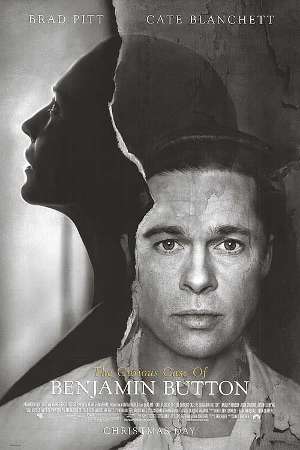- Title: The Curious Case of Benjamin Button
- IMDB: link
So David Fincher (Se7en, Fight Club, Zodiac, Panic Room) and Brad Pitt have tossed their hats into the ‘well, we’ve decided we want an Oscar’ ring with the Christmas Day release of “The Curious Case of Benjamin Button”, a sprawling, nearly 3 hour exercise in how to tempt Academy voters that manages to avoid any semblance of plot or meaning. Ostensibly based on the F. Scott Fitzgerald short story of the same name (which you can read in its entirety here), in truth the two share naught but a title and the central hook of the story: A man who is living his physical life in reverse, de-aging with each passing year.
 Normally I’d use this paragraph to sum up the story (and throw in a few pithy comments), but quite frankly there’s precious little of interest to share. The film is not much else but the timing challenged love story between Benjamin and Daisy (played as an adult by the always wonderful Cate Blanchett), but mostly it’s a collection of vignettes filling in the spaces of when Button is too physically elderly to be with the youthful dance ingenue. Button works on a tugboat with the salty and drunk Captain Dan, uh I mean Captain Mike (Jared Harris)! Button has an affair with the bored wife of a spy! (Tilda Swinton) Button uh… hangs around a lot and starts a successful shrimp business. Wait, no. That’s the other one. In this one he kinda inherits a button factory but doesn’t do anything with it. But you get the point.
Normally I’d use this paragraph to sum up the story (and throw in a few pithy comments), but quite frankly there’s precious little of interest to share. The film is not much else but the timing challenged love story between Benjamin and Daisy (played as an adult by the always wonderful Cate Blanchett), but mostly it’s a collection of vignettes filling in the spaces of when Button is too physically elderly to be with the youthful dance ingenue. Button works on a tugboat with the salty and drunk Captain Dan, uh I mean Captain Mike (Jared Harris)! Button has an affair with the bored wife of a spy! (Tilda Swinton) Button uh… hangs around a lot and starts a successful shrimp business. Wait, no. That’s the other one. In this one he kinda inherits a button factory but doesn’t do anything with it. But you get the point.
There’s certainly a lot of room for storytelling in that high concept hook, but David Fincher and screenwriter Eric Roth are content to do nothing more than re-tell the story of Forrest Gump without all the pop-culture clutter. Pitt is nearly always a compelling actor to watch, but here’s he’s given little to do but look oddly freakish in make-up (or CGI) and react to what’s going on around him. His Button is a blank page who finally becomes interesting just as he’s no longer a character in his own story. Cate Blanchett is forced to carry the weight of the film as the love of Button’s life (though one is forced to wonder how that could be case during her wild 20’s), and while she’s certainly up to the task the script’s lack of focus makes that an almost Sisyphean task.
Quite frankly this is a film that had me feeling like I had put more thought into trying to fit together the more random elements than the filmmakers did themselves. There’s no real explanation for why Button de-ages like he does beyond a tacked on story of a blind clockmaker who made a clock that runs backwards in protest of the lives lost in WWI. The life Button embarks upon when he realizes he can’t stay Daisy and their daughter is shown to us in nothing more than a montage of scenes that looked far more interesting than what I sat through for the previous 2 hours. The only real conflict of the film (Button unwilling to subject his wife and daughter to his continuing de-aging) is almost a throwaway scene in a film that could have easily been trimmed down a good 45 minutes.
But the period costumes and set designs look great! The camera work is gorgeous! The actors are pretty! It’s needlessly sappy and longs for a more innocent time, completely overlooking any of the important issues of the day! In other words: It’s two hours and thirty-some minutes of pure, unapologetic Oscar bait. Save yourself the time and just think about watching Forrest Gump again, and then remember that Gump beat Pulp Fiction for Best Picture.
Yah, it’s like that.
